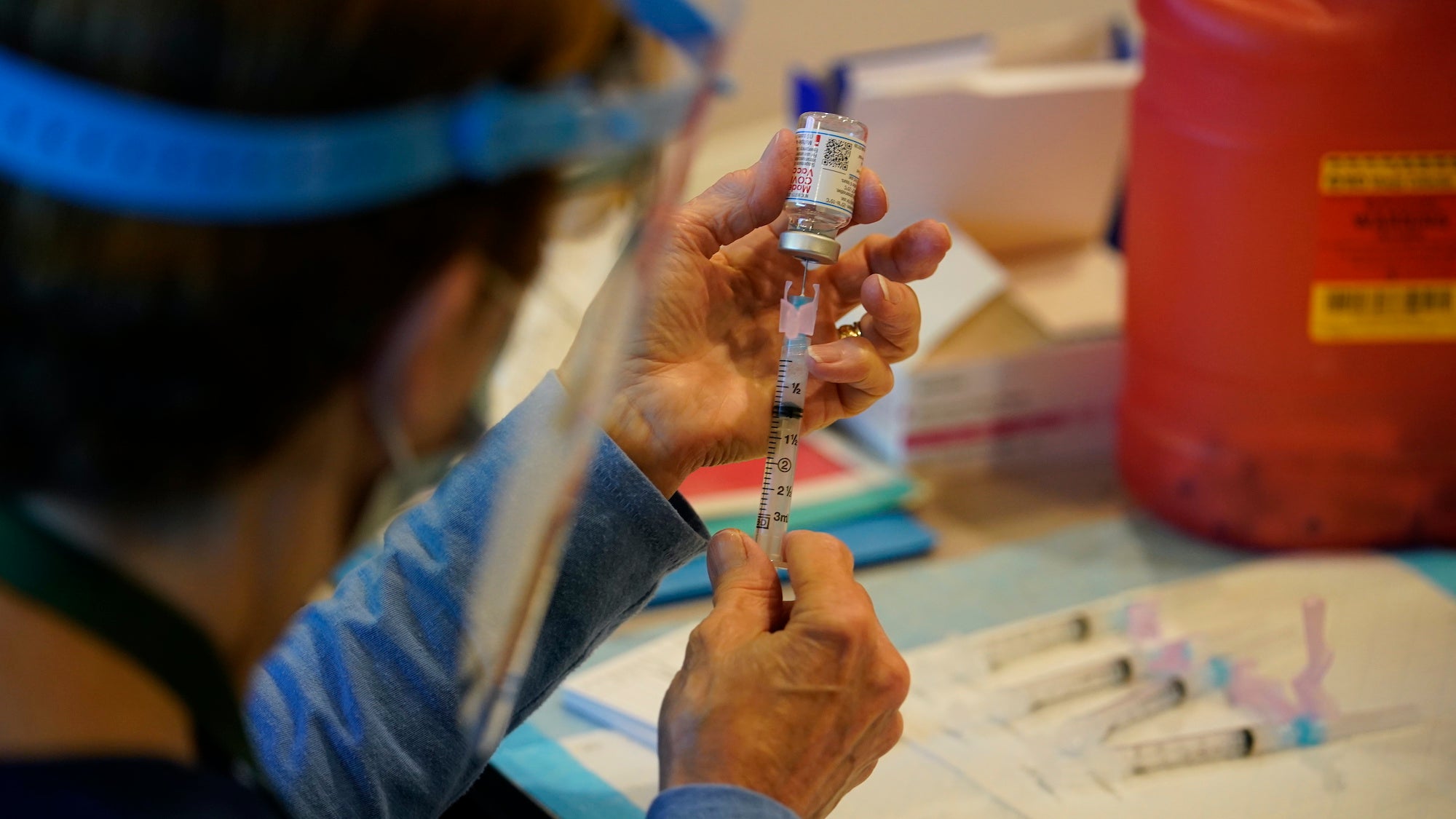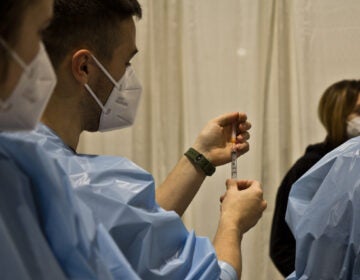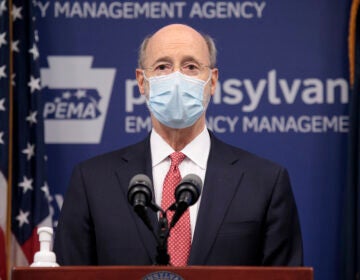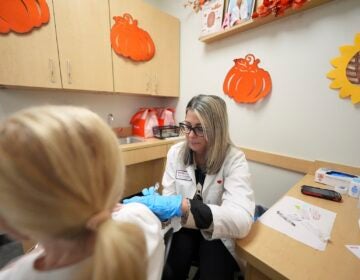Chesco employers say workers want vaccines. Actually getting them is another story
Philly area employers thought encouraging workers to get vaccinated against COVID-19 would be a challenge. That turned out to be the easy part.
Listen 2:24
Alejandro Romero, pictured during the early days of the pandemic, is a crew leader on the farm at Pietro Industries in Kennett Square, Pa. (Courtesy of Chris Alonzo)
Ask us about COVID-19: What questions do you have about the current surge?
Chris Alonzo’s Chester County mushroom farm has operated throughout the COVID-19 pandemic with the hope that a vaccine would find its way into workers’ arms sooner rather than later.
For the past year, Alonzo has followed the federal and state governments’ lead, encouraging his roughly 160 employees, most of them Latino immigrants, to commit to getting vaccinated.
Alonzo said many of the people who work for him at Pietro Industries in Kennett Square are “not very comfortable with the medical side of things in the United States.” They’re used to dealing with smaller clinics in their home countries and don’t know how to navigate the system in the U.S. So their overwhelming demand for the vaccine came as something of a surprise to Alonzo.
“Probably 90% of our workers want the vaccine, and they want it as quickly as possible,” he said.
But now that vaccines are being delivered to the state, it’s not clear when Alonzo’s workers will actually get them, and a recent expansion of who’s currently eligible in Pennsylvania could make the wait time even longer.
“The challenging thing is that when I start to educate our workers about it, of course, the next question is, ‘Great, I want it, when can I get it?’” said Alonzo. “And I have to say one week to three months from now because we really don’t know.”
Food and agricultural workers fall in the 1B phase of Pennsylvania’s vaccination scheme, along with other essential workers, such as manufacturing employees and those staffing grocery stores, public transit, and schools.
In the case of Chester County’s mushroom industry, fueled by the work of mostly Latino workers, outreach has been more proactive than what’s been seen at the state level. Business leaders launched bilingual vaccine education efforts from fliers to one-on-one talks between workers and management.
Across the country, vaccine rollout has been hindered by limited vaccine supply, despite promises of an increase in deliveries. Pennsylvania is no exception. A recent expansion of the 1A phase moved thousands of people ages 65 and older, as well as people with certain health conditions, into this category. The change has only made the timeline for essential workers in the 1B category more nebulous.
In Chester County, the change added 90,000 residents into the 1A category with no immediate increase in the number of doses to be delivered.
While employers say they support making sure more vulnerable residents are vaccinated, they are also concerned about their workers and the future of their businesses.
“Unfortunately, for something that’s been discussed since November, now that we’re in February, I still think the number one common theme for managers and employees is confusion,” said Guy Ciarrocchi, president and CEO of the Chester County Chamber of Business and Industry.
The federal government is not solely to blame for a loss of confidence in a fair vaccination rollout, argued Ciarrocchi.
“In some cases, even knowing where to go or where they fit into classifications [is confusing],” Ciarrocchi said.
These complaints have been echoed by Republican and Democratic lawmakers in Harrisburg.
Critics point to Pennsylvania’s lack of efficiency in distributing the vaccine doses it does have on hand. As of Friday, the commonwealth ranked 41 in the percentage of COVID-19 vaccines administered, according to Becker’s Hospital Review.
Pennsylvania has administered 63% of the vaccines it’s received. The two states topping the list — Utah and West Virginia — are just under 90% distribution. The commonwealth’s neighbors, New Jersey and Delaware, rank 27 with 68% and 13 with 73% distribution, respectively.
When Pennsylvania expanded its definition of the 1A phase to correspond with federal guidelines, leaders in Philadelphia’s collar counties were quick to try and manage the public’s expectations.
“Basically, 40% of all Delaware County residents fall into Phase 1A, which means that you got a lot of people who are in this priority group … We got 1,000 vaccines this week, [and] we just don’t have the supply in order to really meet all of these people,” Delaware County Councilmember Kevin Madden said recently. “The reality is there is a nationwide shortage.”

Similar frustration was expressed by Diane M. Ellis-Marseglia, chair of the Bucks County Commissioners. Montgomery County Commissioner Ken Lawrence called the change “tremendously unfair” to essential workers whose public-facing jobs put them at greater risk of exposure in a pandemic.
The commonwealth, however, continues to urge patience. In an email, health department spokesperson Barry Ciccocioppo noted supply limits were evident even before the Centers for Disease Control and Prevention recommended states include people over 65 in the first wave of inoculation.
“As difficult as it may be to hear, patience is required as vaccine providers focus on health care workers who keep us all healthy and our most vulnerable residents who are at higher risk to develop a severe case of COVID-19 and are more likely to die from it,” Ciccocioppo said. “The state’s vaccination plan is designed to save lives.”
The state expects the supply of vaccines to increase as other companies move forward in the process for Federal Drug Administration vaccination approval.
For his part, Ciarrocchi is tired of preaching patience to business leaders and their workers.
“Patience, yes. But you know, the squeaky wheel gets the oil,” he said. “I think we’re at a point where we need to be a little more squeaky across Pennsylvania and figure out what’s going on.”
He’s asking Chamber of Commerce members to write to their politicians and demand better communication regarding vaccine rollout.
In the meantime, essential workers in the 1B category continue coming to work every day.
Many of Alonzo’s mushroom workers commute to and from multigenerational homes, which has been shown to increase the risk of transmission. This has played a role in motivating workers to get the vaccine as soon as possible because they worry about what could happen the longer they wait, especially with the presence of new COVID-19 variants in the region.
“They could infect their grandparents … Other people are going to work in other communities and other industries and there’s a chance for cross-infection,” said Alonzo. “And then the Hispanic community is tight-knit, so if someone does get coronavirus, there’s a chance that it’s spreading.”
While workers wait for a timeline, their bosses and union leaders press forward with outreach.
Wendell Young IV is president of UFCW Local 1776, which represents 11,000 workers in the Philadelphia region, with more than 60% of its membership working in grocery stores.
Fighting disinformation about what is in the vaccine and side effects is a top priority. The union has used robocalls, texts, and fliers as a way to answer frequently asked questions.
Some businesses are going the extra step. Food processing company JBS, which has a meatpacking plant in Montgomery County, has agreed to pay workers $100 if they roll up their sleeves for a vaccine. Young said JBS workers make up 1,500 of the union’s membership.
“My discussions with these retailers where we represent the workers is they’re ready,” said Young. “They’ve got their websites ready. They’re able to take the reservations there. They’ve got the staff ready.”
They just need the vaccines.

Get daily updates from WHYY News!
WHYY is your source for fact-based, in-depth journalism and information. As a nonprofit organization, we rely on financial support from readers like you. Please give today.






![CoronavirusPandemic_1024x512[1]](https://whyy.org/wp-content/uploads/2020/03/CoronavirusPandemic_1024x5121-300x150.jpg)



